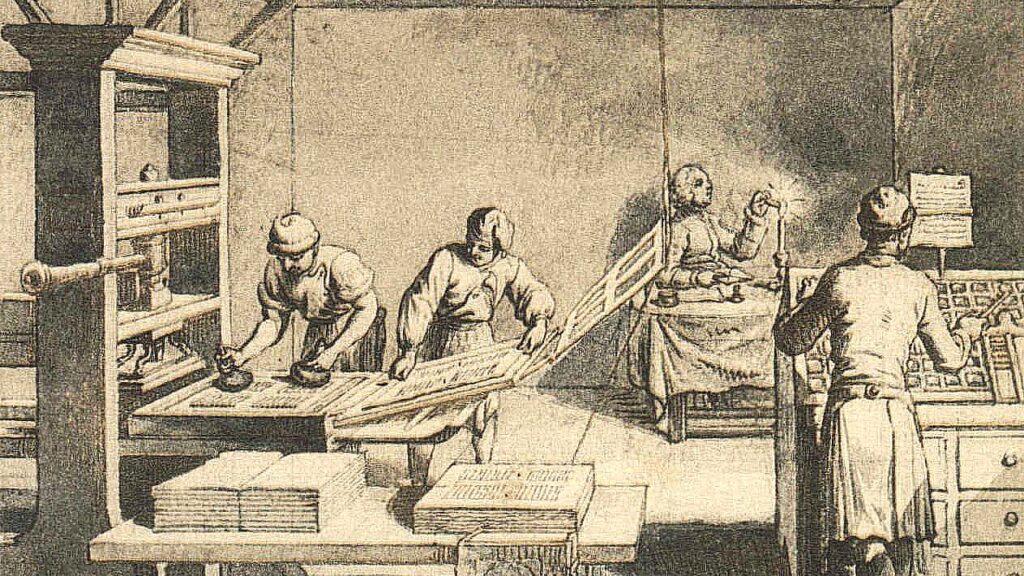One of the most important innovations, and one that marked a milestone in human history, was undoubtedly the invention of the printing press. At that time, reading was reserved for a select few, primarily the clergy and nobility. It is estimated that only about 12% of the European population could read.
The few books that existed, produced by hand and copied by hand, were kept mainly in monasteries. The church was the main source of information, transmitted orally.
The arrival of the printing press would revolutionize the world. Suddenly, people had access to a vast amount of information, which also gave rise to critical thinking.
This was not welcomed by those who, throughout history, have sought to control information and thought. Although the first printed book was a Bible, as early as 1559, Pope Paul IV established an Index Librorum Prohibitorum, a list of all books prohibited to Catholics.
Since then, the Church and various governments have censored, banned, and burned thousands of books. Authors such as Shakespeare, Goethe, Daniel Defoe, Victor Hugo, Charles Darwin, George Eliot, of course Salman Rushdie, and hundreds more have been banned throughout history.
The IPA has stood up, since its foundation, for the freedoms of expression, to publish and to read.
The person responsible for this information revolution in the 15th Century was the son of a patrician from the city of Mainz, Germany. His name was Johann Gensfleisch zur Laden zum Gutenberg, better known as Johannes Gutenberg.
Some of the elements of his invention were movable type, an oil ink that soaked into metal and then transferred easily to paper, as well as a new printing press, probably adapted from those used for winemaking.
Like every endeavor, Gutenberg’s was not without financial problems. A wealthy financier, Johann Fust, invested in his project, but later won a lawsuit against Gutenberg, which allowed him to use the invention as his own, continuing to produce Bibles and Gutenberg’s second masterpiece, a psalter.
In 1465, the Archbishop of Mainz granted Gutenberg a pension, granting him an annual ration of grain, wine, and clothing. Shortly thereafter, in 1468, Gutenberg died in his native Mainz.
The establishment of the printing press in Mexico, the first in the Americas, is also an interesting story.
Juan Cromberger, a German printer established in Seville and owner of a prestigious publishing house with capital to establish a branch in the New Spain, entrusted Juan Pablos, whom he trusted as a copyist or typesetter, to found a printing press in the New World.
Juan Pablos, of Italian origin and whose name, Giovanni Paoli, we know now in Spanish, arrived in Mexico City with his wife Gerónima Gutiérrez, between September and October 1539.
With the support of his sponsors, Juan Pablos established the “House of Juan Cromberger” workshop in the “Casa de las Campanas”, Bishop Zumárraga’s house, located on the southwest corner of Moneda and Santa Teresa la Antigua streets, now known as Licenciado Verdad, across the street from the former archbishopric. The workshop opened its doors around April 1540.
The world has evolved at an immense speed since the 15th and 16th centuries. Today, nearly 4 million book titles are produced annually worldwide.
In the paradox of the information age, the world is drowning in information, yet starving for knowledge. Furthermore, it is still worrying that, despite so much truthful information available, disinformation and fake news have grown exponentially.
It is incredible that nowadays science is being questioned, global warming is being denied, the effectiveness of vaccines is being denied, and thousands of people firmly believe that the Earth is flat. Inexplicably, the Trump administration in the United States has withdrawn from the United Nations’ 2030 agenda.
In addition to the millions of books, newspapers, and magazines printed daily, the graphic arts industry has evolved impressively. Today, there is virtually no economic activity that is not touched by the graphic arts. Printed in Offset and rotary printing presses, but also on boxes and packaging of all types, labels, calendars, textiles, point-of-sale displays, promotional items, and so much more.
On a personal note, it seems I was destined for the publishing and graphic arts industry. Like many surnames that reflect a profession, mine, in German, represents a “typesetter,” or the person who used to “set” movable type in a printing press.

